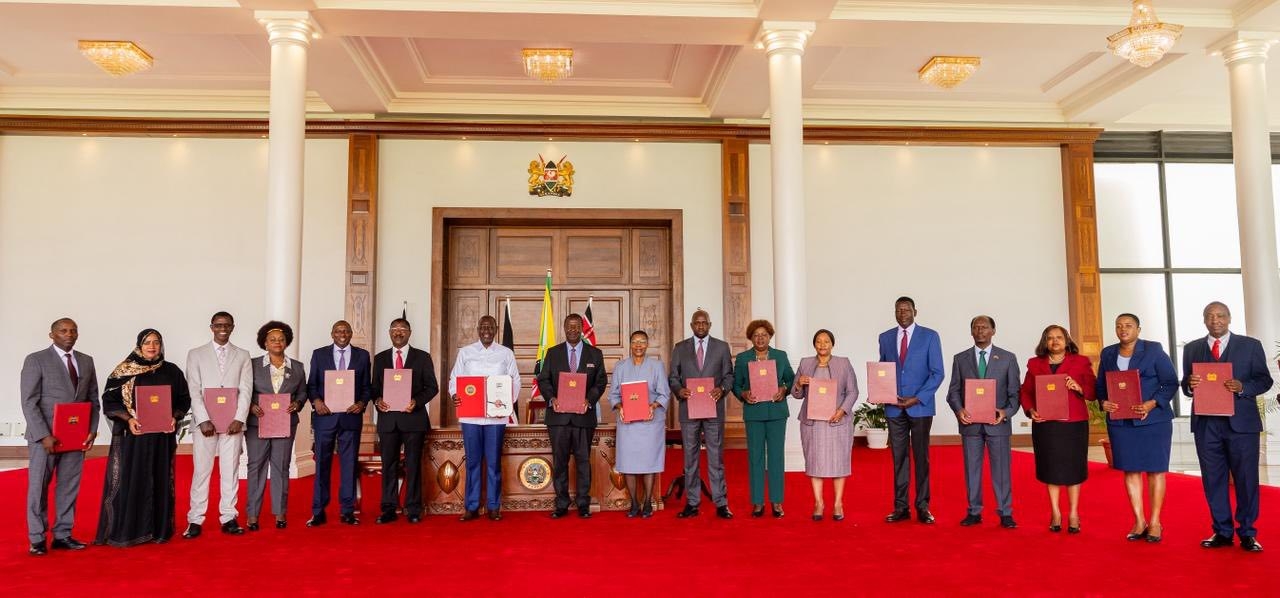A community-based organisation in Kitui County has started giving farmers drought-resistant seeds to help cushion them from climate shocks.
Inyamandu community-based seed merchant is giving farmers climate-smart green grams and cow peas seeds it is producing. This follows the lack of access and availability of the seeds to farmers.
John Kimanthi, executive director of Inyamandu CBO Seed Merchant in Kiuziani market in Kitui Rural subcounty, said they have received a green light from the Kenya Plant Health Inspectorate Service to produce certified seeds.
Inyamando CBO Seed Merchant factory was started in 2009 with water, food security and support to orphaned and vulnerable children being their first projects.
It is from this background that they singled out seed production to increase food security.
The CBO was registered in 2002 by Kephis as a seed merchant in accordance with the Seed and Variety Act Cap 326 on seed companies.
Kimanthi told the Star during a visit to the seed factory that they work closely with the Kenya Agricultural and Livestock Research Organization which has licensed them to use their breeder materials to produce seeds.
“Since 2020, we have been producing drought tolerant crop seeds that are adapted to semi-arid areas. We have been licensed by Kalro to produce green grams, Karembo and Biashara variety. We also produce cowpeas, K8 varieties,” he said.
“We have a license to produce maize seeds-KDV1 and KDV2 varieties but we have started with green grams."
He said they get breeder seeds from Kalro and give them to seed outgrowers accredited for planting. Once the seeds are planted, Kephis then inspects the crops in the field.
After approval by the regulatory agent, the farmers then harvest and clean the seeds before selling them to the CBO.
Kimathi said the seed factory buys the seeds and using a drum, they mix the seeds with insecticide, fungicide and inoculants. The seed is then packaged ready for sale to farmers and in the local markets.
The certified seeds are packaged in one or two kilogram packets in the factory’s branded seed packets that are sealed.
Before dressing and during the dressing, Kephis takes samples to test germination rate, purity, trueness of the particular variety and also the moisture content.
Once Kephis has approved it, the regulator issues the CBO with the final seed certification certificate, which is yellow in color.
“Every packet has to have a sticker. When you scratch the center of the sticker, you get a number-1393. It will bring you the details of that seed among them, which crop, variety, grade, the company that processed it and all,” he said.
They sell the seeds either directly to the farmers, the agro dealers, county governments or to non-governmental organizations.
Kimanthi said this year, they have been able to produce 9.5 tons of green grams of the biashara variety and 4.5 tons of cowpeas-K8 variety.
He said in order to ensure quality of seed production, they have trained about 120 farmers to grow the green gram seeds.
This has been made possible through the USAID funded Feed the Future- Kenya Crops Dairy Market System project which has provided training, continuous mentorship and also supported in accessing quality basic seeds from breeders from the national research organisation, Kalro.
“This has helped strengthen the capacity of our seed growers. We have realised an increased production as the seed is of superior quality. They have also supported the processing of the seed to ensure farmers have clean seeds,” Kimathi said.
“Because we want our farmers to have the best harvest in terms of the quality and also the quantity, we do soil testing through collaboration with partners. Once we know the status of the soil, the agrovet that we work with then advises the farmer (s) on whether to put lime or which fertiliser to use."
He added that the germination rate of the seeds is high and from the feedback they get from farmers, the seeds are well adapted to the semi-arid areas for high yields.
Jane Biashara, market systems lead in the Kenya Crops and Dairy Market systems project said they were partnering with the Anglican Development Services to help farmers access quality seeds. This was aimed at cushioning farmers in Kitui, Makueni and Taita Taveta counties against micro economic shocks.
“With consistent or continued drought, seed is affected. Using the market systems, we are working with seed merchants and we have been able to support two seed merchants who are currently registered by Kephis under Makueni agri-ventures,” she said.
She added that Inyamando Seed Merchant in Kitui is one of the seed merchants supported under the project.
Biashara said when they came on board, production for the CBO seed merchant was below one ton per year but their potential increased their yields.
The difference between a seed grower and a farmer is that the seed grower has to undergo training by Kephis and get certification for a seed grower, while a farmer does not.
“We have built the capacity of about 120 seed growers in partnership with Kalro and Kephis. The seed growers were supported with seeds which they planted over 336 acres of land. They were producing less than a ton but now they are producing 14 tons of both green grams and cowpeas,” she added.
Baishara said they are seeking to help increase the production of quality certified seeds under a five-year project started in 2018 as a major project for agriculture funded by USAID-Feed the Future.












